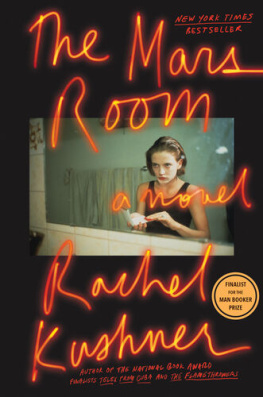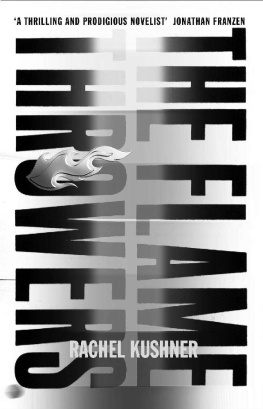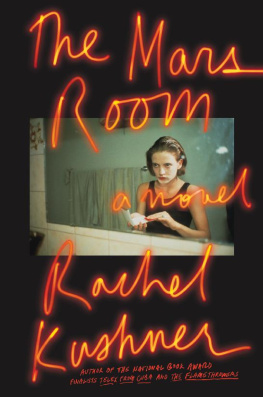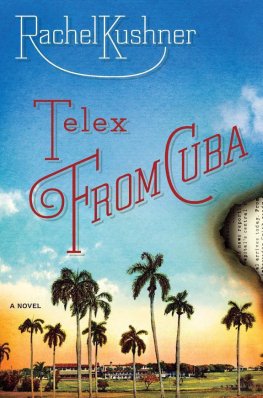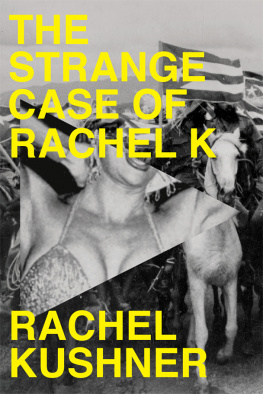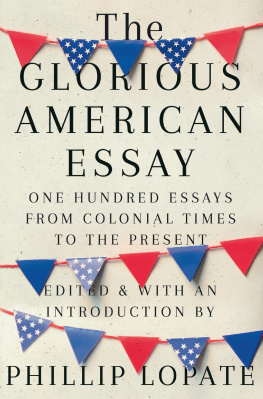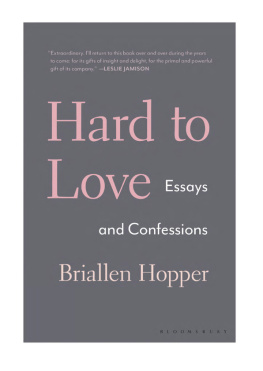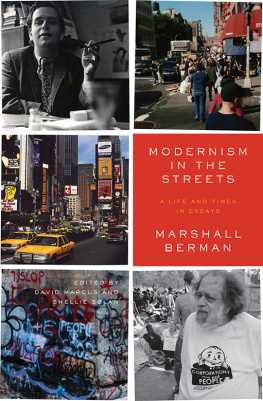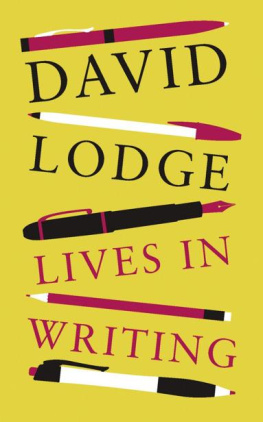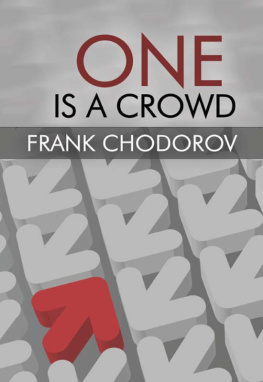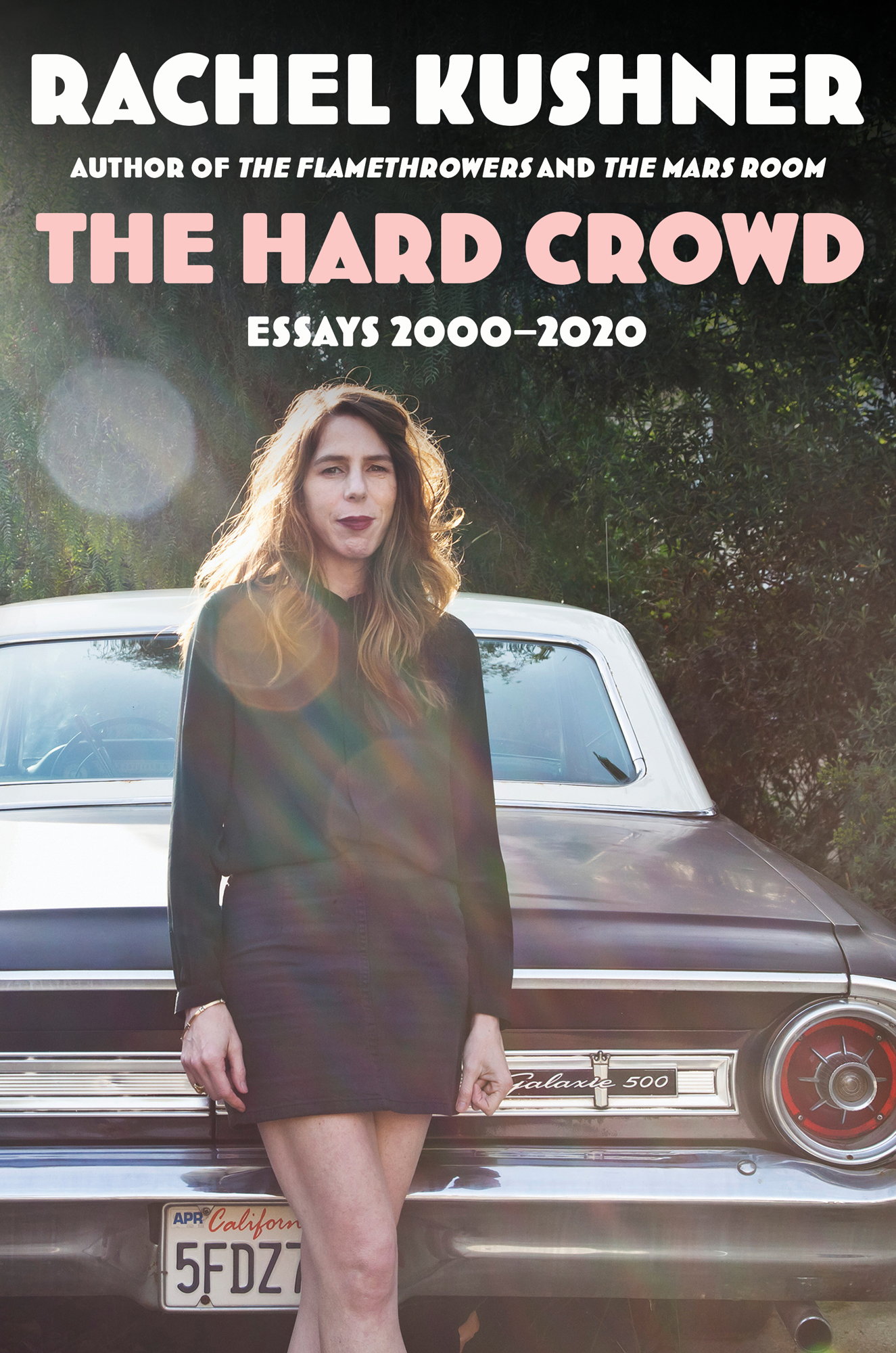
Rachel Kushner
Author of the Flamethrowers and the Mars Room
The Hard Crowd
Essays 20002020
Also by Rachel Kushner
Telex from Cuba
The Flamethrowers
The Strange Case of Rachel K
The Mars Room

Scribner
An Imprint of Simon & Schuster, Inc.
1230 Avenue of the Americas
New York, NY 10020
www.SimonandSchuster.com
Copyright 2021 by Rachel Kushner
All rights reserved, including the right to reproduce this book or portions thereof in any form whatsoever. For information, address Scribner Subsidiary Rights Department, 1230 Avenue of the Americas, New York, NY 10020.
First Scribner hardcover edition April 2021
The epigraph on page vii is from The Passion According to G.H. by Clarice Lispector, translated by Idra Novey.
SCRIBNER and design are registered trademarks of The Gale Group, Inc., used under license by Simon & Schuster, Inc., the publisher of this work.
For information about special discounts for bulk purchases, please contact Simon & Schuster Special Sales at 1-866-506-1949 or .
The Simon & Schuster Speakers Bureau can bring authors to your live event. For more information or to book an event, contact the Simon & Schuster Speakers Bureau at 1-866-248-3049 or visit our website at www.simonspeakers.com.
Interior design by Wendy Blum
Jacket design by Jaya Miceli
Jacket typeface inspired by The Flamethrowers jacket design by Charlotte Strick; Jacket photograph by Ann Summa
Library of Congress Cataloging-in-Publication Data has been applied for.
ISBN 978-1-9821-5769-2
ISBN 978-1-9821-5771-5 (ebook)
This book is for Peter Kushner and Pinky Drosten Kushner.
What others get from me is then reflected back onto me, and forms the atmosphere called: I.
GIRL ON A MOTORCYCLE
I often hid in the garage after I was kicked outside to play on summer days. Its attractions for a young child were a wooden-wheeled scooter I rode around on the smooth concrete floor; stacks of crated peaches, there for pilfering until my mother got around to her canning; and a 1955 Vincent Black Shadow. The Vincent was my fathers motorcycle, which he had bought in England in 1965, three years before I was born. My parents and older brother, just a baby, were living in London, in a cold-water flat in Kentish Town, then working class, where a famous theorist of the working classKarl Marxalso once lived. While my twenty-two-year-old mother was upstairs boiling diapers on the stove (in a pot she filled from a common spigot in the hall), my father spent his days working on his motorcycle on the street in front of their building. When it was too dark to continue work on the bike, he went to the pub to read books, as the electricity in my parents flat ran on a coin-operated meter and was prohibitively dear, at least for them. My father still claims that pub culture and class consciousness go hand in hand, because everyone went to the bar for the free electricity. (By everyone, I believe he means men.) But, as the story goes in our family, on Guy Fawkes Night my father was home with my mother, watching out the window as people dragged unwanted furniture and other junk to a blazing bonfire in the street, in keeping with the custom of the holiday, which commemorates Guy Fawkess attempt to blow up Parliament, in 1605. When a woman pushed an empty baby pram toward the fire, my mother handed my brother to my father and ran downstairs to retrieve it. She wanted it so badly that she was in tears as she pleaded with the woman not to burn it. The woman relented and gave my mother the pram. It was a Silver Crossa luxury makebut dirty and with a stretched spring that caused it to list to one side. My mother was thrilled with her lopsided hooptie, and she would push my brother down to Regents Park while my father endlessly tinkered with his Vincent.
On occasion, my father rode the Vincent out to the Ace Cafe, a twenty-four-hour roadhouse diner with a giant neon sign, where the phenomenon of caf racing was popularized. A Vincent Black Shadow was an exotic bike at the Ace, where people mostly had Triumphs, BSAs, and Nortons, tricked out with drop bars and rearsets, but the Vincent was a very fast bike in its day, with a huge (1,000 cc) motor. The first time my dad rode out to the Ace, which was on a ring road in northwest London, an argument was taking place out front, where bikes were lined up in gleaming rows. Some misguided troublemaker was defending the Mods (the Ace was strictly a Rocker scene). Mary Quant and the fashion world had claimed the Mods and their dandyish, androgynous look, their Vespas and Lambrettas, as an ascendant trendone that threatened to overtake the Rockers as the image of cool. My father asked one of the Rockers, So whats this about? The guy said of the Mods, Theyre fucking women is what!
The Rockers were men and needed you to know it. The Mods were women. And women were also women, pushing prams. It was all before my time but loomed large in my imagination, out there in the garage. What was I? A child who coveted my fathers motorcycle.
My parents moved back to the United States on a Greek freighter at the end of that year, and the Vincent came with them. Theres a dent in its oxidized black gas tank from where it was dropped carelessly from the freighter to a loading dock. Alone in the garage, I would lift up its green canvas cover and listen for the tick and ting of its cast-aluminum engine shifting in the summer heat. It was coated in grime, leaking murky black oil into a pan beneath its motor, but even lodged on its center stand, both wheels off the ground, and only started as an annual event, to me it seemed an animate thing. My older brother couldnt have cared less about the difference between monkey and Allen wrenches; it was me who was willing to stand in the rain as the riders in the vintage British rally passed, my mother and me sinking into the mud on the side of the road, and me, at seven, computing that engine oil under the nails, the ability to kick-start a four-stroke or handle a suicide clutchthese were not just skills but character.
In the 1968 Anglo-French film Girl on a Motorcycle, Alain Delon gives Marianne Faithfull, his young mistress, a Harley-Davidson. For much of the movie she is on the bike, blissful and windblown as she cruises the European countryside. The motorcycle was a wedding gift: wheels to take her from Alsace, where she lives with her unwitting schoolteacher husband, to Heidelberg, where she surrenders herself to Delon for attention and debasement (in one unintentionally camp sequence, he spanks her with a bouquet of roses).
Although we see her alone on the Harley, its Delon who is driving her destiny. He has given her the bike for the purpose of ferrying her away from her husband and into his control. Yet theres no getting around the machines intrinsic nature, that it is propelled by tremendous forward motion and steered by the rider. When shes on it, shes alone and moving fast. She passes through the French/German border at sunrise, wearing a tight black leather catsuit with nothing underneath, and wondering if the grinning agent will make her unzip (the films original title was Naked under Leather). The agent pats her ass and waves her through. Although she goes to see Delon, theoretically she could go anywheretour Bavaria or jet off to Poland, while he smokes and broods, meanly handsome and alone.

